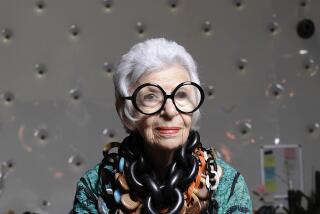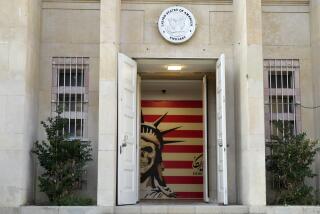Cherif Guellal dies at 76; Algerian resistance fighter and diplomat
Cherif Guellal, an Algerian resistance fighter, businessman and diplomat who cut a glamorous figure in Washington society and was the longtime companion of a former Miss America, died of leukemia Tuesday at a hospital in Algiers. He was 76.
Guellal was a veteran of the bloody independence movement that in 1962 secured freedom for his North African country from French rule. After serving as a top lieutenant to Ahmed Ben Bella, the rebel leader turned president, Guellal arrived in Washington, D.C., as post-colonial Algeria’s first ambassador to the United States.
His good looks enhanced his popularity at soirees and made him a compelling presence at academic gatherings. “We wish to be masters in our own house and not junior partners of the great powers,” he said at a 1964 meeting of U.S. political and social scientists, describing the Algerian drive toward independence.
Guellal remained his country’s chief envoy in Washington after military leader Houari Boumedienne toppled Ben Bella’s government in a 1965 coup. Guellal told President Lyndon B. Johnson that he hoped relations would improve between the two countries. It was a union born of oil money, from Johnson’s native Texas and the oil-rich states of the Arab world, wrote society host-turned-writer Barbara Howar in her 1973 memoir “Laughing All the Way.”
The unmarried Guellal became a social success as he settled into the ambassador’s residence, a French chateau-style home called the Elms, that had belonged at times to Johnson and grand hostess Perle Mesta.
In her book, Howar called Guellal a “handsome and brilliant young freedom fighter” and a “roving intellectual” who became much in demand among the Embassy Row elite and local society “Swing Set.”
His constant companion was raven-haired Yolande Fox, the Alabama-born Miss America of 1951 and the widow of a movie and TV executive.
Compared with others, Howar wrote, Guellal “entertained less often and less lavishly but in a certain swashbuckling style that drew together the keener political minds, celebrated academicians, international radicals and showbiz luminaries who were the residuals of Mrs. Fox’s years of salon-keeping in New York and Los Angeles.”
Guellal became a fixture of society columns. His social secretary was Sally Quinn, who became a Washington Post reporter and chronicler of the city’s power elite.
The 1967 Arab-Israeli War severed diplomatic ties between the United States and Algeria and ended Guellal’s term as ambassador. He remained Algeria’s unofficial representative in Washington while shuttling between homes in Georgetown, Algiers and Paris and consulting for U.S. companies hoping to conduct business in the Arab world.
He became a representative of the state-owned energy company Sonatrach, which played a crucial role helping meet demands during the world oil crisis of the 1970s.
Cherif Ali Guellal, a doctor’s son, was born in Constantine, in eastern Algeria, on Aug. 19, 1932.
His mother, Fatima, became a leader in anti-French resistance groups. She was imprisoned and tortured by the French, as were many other members of the family.
Guellal graduated in 1956 from a university in Aix-en-Provence, France, before joining the Algerian provisional government in exile. He mostly worked from India for the independence movement, trying to build international support for the resistance, before winning his appointment to Washington.
In the capital, he successfully fought the city to remove a racially restrictive covenant on the new ambassadorial residence. The late Washington journalist and society historian Hope Ridings Miller wrote in her book “Embassy Row” that Guellal’s efforts led the District of Columbia government to remove many more such discriminatory covenants citywide.
Guellal never married Fox, but they considered each other spouses, and he helped raise her daughter. Fox survives in Washington, along with her daughter, Dolly Fox of New York and Washington. Other survivors include three brothers and a granddaughter.
Bernstein writes for the Washington Post.
More to Read
Start your day right
Sign up for Essential California for the L.A. Times biggest news, features and recommendations in your inbox six days a week.
You may occasionally receive promotional content from the Los Angeles Times.






